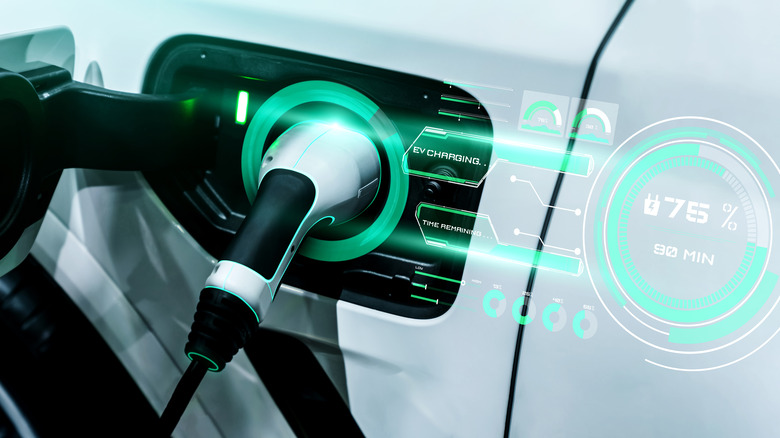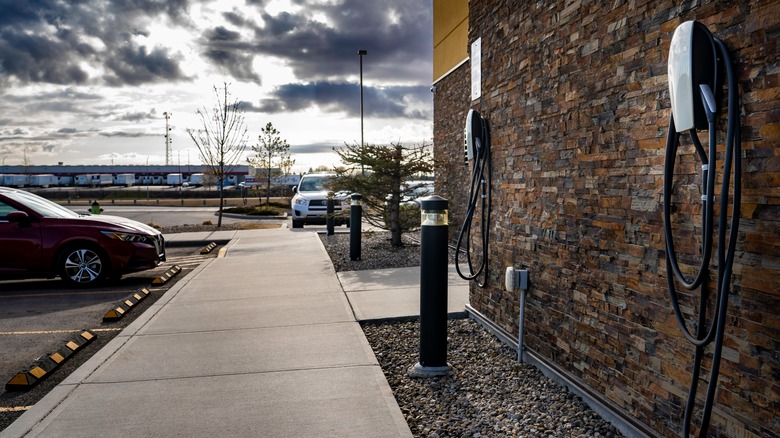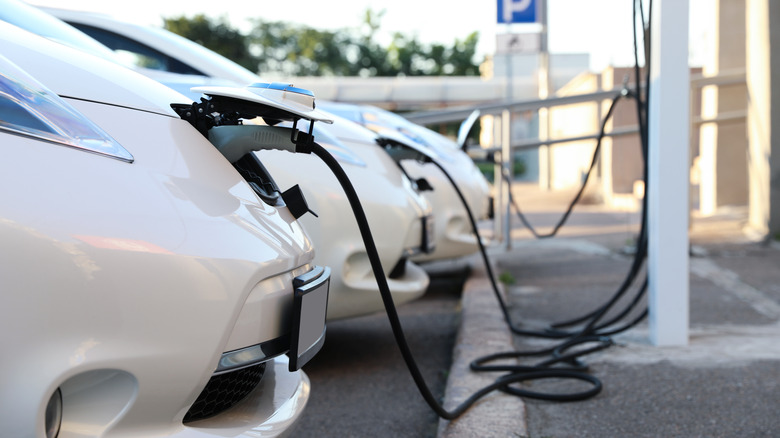Here's How Much It Costs To Charge Your EV On A Road Trip
Driving an electric vehicle has become a great option for many in the modern marketplace. EVs now boast substantial range on a full charge, with some of the longest-range models sporting total mileage in excess of 300, 400, or even 500 miles without stopping for a charge.
But invariably, EV drivers who are hitting the highway to go on a long weekend or even a weeklong trip with friends or family will need to stop to recharge their car at some point and consider which of the three levels of charging equipment they are able to take advantage of. Charging infrastructure across the United States is improving and so it's likely that you won't have much issue finding a place to add crucial juice to your EV battery. But the costs associated with these mid-road trip charges can be a hard thing to pin down. The U.S. Energy Information Administration notes that electricity costs can vary greatly from state to state, and so a trip that sees you leaving your home state will naturally force you to contend with energy pricing that may be dramatically different from what you're used to.
Even though this pricing can be hard to calculate exactly on a generalized level, there are some things that you can take advantage of in order to understand what you're likely going to pay to take your EV away on a road trip.
Using route planning apps can help illuminate charging costs
Maps, apps, and information sources of other varieties or a crucial resources for drivers taking on a road trip. This is true for all drivers, regardless of the type of car that sits in the driveway. According to AutoEvolution, the commonly used directions app Waze can help you find gas stations that offer a fill-up for the lowest prices along your route, and there are many apps that do the same thing for EV charging stations.
Infrastructure for EV charging is growing rapidly across the United States, and so drivers aren't likely to find themselves in a lurch when it comes to topping off the range on their car's battery. Still, the need is different from what many people might be used to. As a result, planning out a route will take on a more nuanced set of requirements as drivers plan both directions for the trip and candidate stopping points to charge the car along the way.
Route planning apps that help you find charging points are an important resource when it comes to planning directions, but these features can also help a driver makes sense of how much it might cost to fill up the car at any given spot along the journey. According to Car Sloth, apps like ChargePoint, Zap-Map, or PlugShare show you where charging equipment is, what type of plug-in infrastructure you can find at each station, and what you should expect to pay.
These features, and hotel charging installations can help you schedule necessary stops
Charging apps provide a crucial clarity to EV owners as they set out on a road trip across their state or even the country. But this shouldn't be the only resource that you fall back on when planning your next road trip. Charging an electric vehicle takes longer to reach full capacity then filling up a traditional car with gas. This means that unless you are able to plan a perfectly coordinated trip that sees your car charging every time you park the vehicle and leave it behind to explore something, relying solely on charging stations will force you to take breaks along the way that may impede your progress.
PlugShare reports that many hotels, shopping centers, and other typical city and town parking areas provide free or paid charging facilities on their premises. Booking a room in a hotel that provides charging equipment in the parking lot will help you cut down on the time you have to spend during the day charging the car. In the same way that an EV parked in your garage can be fully and reliably charged every morning, hotel charging equipment provides a key boost to your effective range without any sacrifice to your daily plan while on vacation. Similarly, driving to a location for dinner that allows you to plug the car in can give you an hour or two of additional charge for the battery without having to plan it into your driving schedule.
The brass tacks
Nationally speaking, it should cost between $10 and $30 to top up an EV battery (with a level 3 charger) while away from home. These estimates involve a sizeable gulf, to be sure, yet the trend appears to hold across the United States, according to Investopedia.
It should be noted that charging your EV with public infrastructure will generally cost far more than the price of electricity at home: Kelley Blue Book estimates a rough price of about $59 per month (based on a national average electricity cost of 15 cents per kWh). MomVanUp notes that a healthy road trip plan should involve a maximum of roughly 450 miles per day on the roadways, which could easily add up to a fresh charging requirement at the end of each day. The distance you're traveling should always be factored in to establish a baseline estimate for the overall cost. As well, a combination of careful route planning and the use of an EV-friendly app or two and free charging whenever possible can help make your next expedition a trip to remember!



